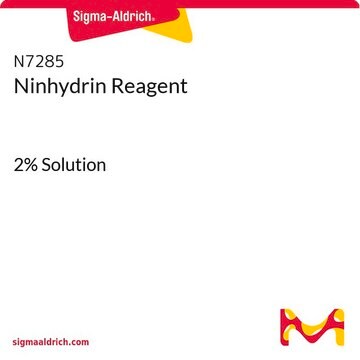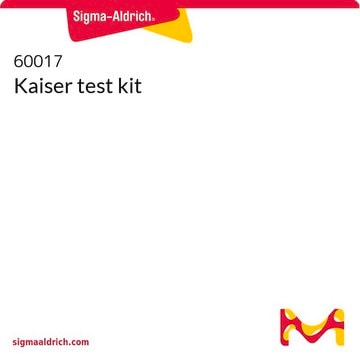151173
Ninhydrin
ACS reagent
Synonym(s):
1,2,3-Indantrione monohydrate, 2,2-Dihydroxy-1,3-indanedione, Trioxohydrindene monohydrate
About This Item
Recommended Products
grade
ACS reagent
Quality Level
description
identification and melting point passes test
form
solid
color
white to brownish white, crystals
mp
250 °C (dec.) (lit.)
solubility
H2O: passes test
suitability
passes test for sensitivity to amino acids
SMILES string
OC1(O)C(=O)c2ccccc2C1=O
InChI
1S/C9H6O4/c10-7-5-3-1-2-4-6(5)8(11)9(7,12)13/h1-4,12-13H
InChI key
FEMOMIGRRWSMCU-UHFFFAOYSA-N
Looking for similar products? Visit Product Comparison Guide
Related Categories
General description
It is employed for nitrite detection in various samples, identifying contamination, and is also used as a colorimetric reagent.
Application
Signal Word
Warning
Hazard Statements
Precautionary Statements
Hazard Classifications
Acute Tox. 4 Oral - Eye Irrit. 2 - Skin Irrit. 2
Storage Class Code
11 - Combustible Solids
WGK
WGK 3
Flash Point(F)
Not applicable
Flash Point(C)
Not applicable
Personal Protective Equipment
Choose from one of the most recent versions:
Certificates of Analysis (COA)
Don't see the Right Version?
If you require a particular version, you can look up a specific certificate by the Lot or Batch number.
Already Own This Product?
Find documentation for the products that you have recently purchased in the Document Library.
Articles
Discover the detection of milk adulteration by whey using spectrophotometric estimation of sialic acid in three different milk brands. Learn more about this essential technique in our application note.
Discover the detection of milk adulteration by whey using spectrophotometric estimation of sialic acid in three different milk brands. Learn more about this essential technique in our application note.
Discover the detection of milk adulteration by whey using spectrophotometric estimation of sialic acid in three different milk brands. Learn more about this essential technique in our application note.
Discover the detection of milk adulteration by whey using spectrophotometric estimation of sialic acid in three different milk brands. Learn more about this essential technique in our application note.
Our team of scientists has experience in all areas of research including Life Science, Material Science, Chemical Synthesis, Chromatography, Analytical and many others.
Contact Technical Service









